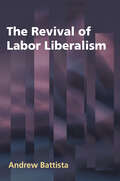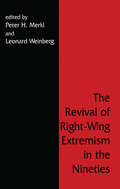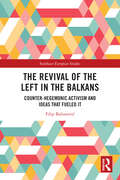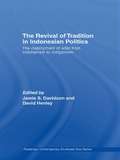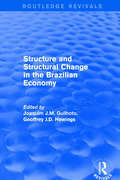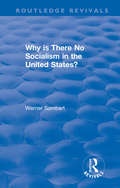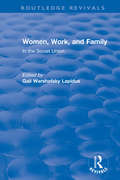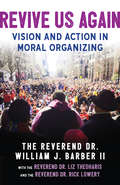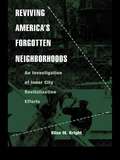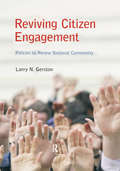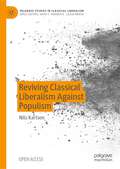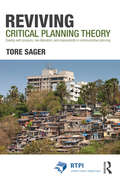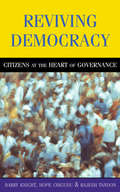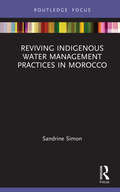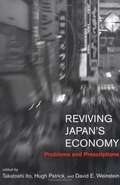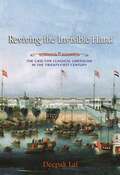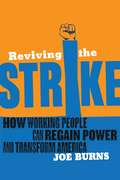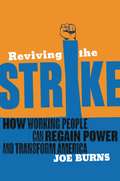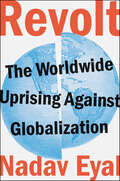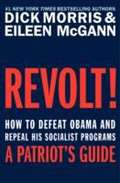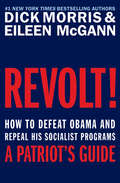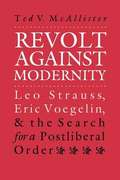- Table View
- List View
The Revival of Labor Liberalism
by Andrew BattistaThe Revival of Labor Liberalism is a careful analysis of the twentieth-century decline of the labor-liberal coalition and the important efforts to revive their political fortunes. Andrew Battista chronicles the efforts of several new political organizations that arose in the 1970s and 1980s with the goal of reuniting unions and liberals. Drawing from extensive documentary research and in-depth interviews with union leaders and political activists, Battista shows that the new organizations such as the Progressive Alliance, Citizen Labor Energy Coalition, and National Labor Committee made limited but real progress in reconstructing and strengthening the labor-liberal coalition. Although the labor-liberal alliance remained far weaker than the rival business-conservative alliance, Battista illuminates that it held a crucial role in labor and political history after 1968. Focuses on a fraught but evolving partnership, Battista provides a broad analysis of factional divisions among both unions and liberals and considers the future of unionism and the labor-liberal coalition in America.
The Revival of Right Wing Extremism in the Nineties
by Peter H. Merkl Leonard WeinbergMost studies of the radical right concentrate on movements in a single country, neglecting to some extent the international dimensions of right-wing extremism. Here, Merkl and Weinberg adopt a comparative perspective, concentrating on the revival of the right across a variety of countries.
The Revival of the Left in the Balkans: Counter-Hegemonic Activism and Ideas that Fueled It (Southeast European Studies)
by Filip BalunovićThis book explores how the critical discursive breakthrough of social movements in Serbia, Bosnia and Herzegovina, and Croatia disrupted the post-socialist transitional status quo.While critical ideas have long fueled social and political actions, the specifics of their relationship with activism have received limited scholarly attention. This book discusses the emergence of new left actors through the lens of a maturation of consciousness, rather than the opening of structural or other “windows of opportunity,” suggesting the potential for such actors to emerge stemmed from the exposure of a segment of the populace to critical ideas. Questions surrounding the relevance of different types of knowledge in contemporary movements, their origins, dissemination, and the organizational factors shaping their adoption within social movement collectives are central to this work as the author digs into the intricate relationship between critical knowledge and activism, explores the cognitive underpinnings of critical social and political engagement, and examines the influence of both non-theoretical and theoretical knowledge.This book will be of great value to postgraduate students and scholars in social sciences, particularly those studying social movements and Eastern and Southeastern European politics.
The Revival of Tradition in Indonesian Politics: The Deployment of Adat from Colonialism to Indigenism (Routledge Contemporary Southeast Asia Series)
by Jamie S. Davidson David HenleyThe Indonesian term adat means ‘custom’ or ‘tradition’, and carries connotations of sedate order and harmony. Yet in recent years it has suddenly become associated with activism, protest and violence. This book investigates the revival of adat in Indonesian politics, identifying its origins, the historical factors that have conditioned it and the reasons behind its recent blossoming. It considers whether the adat revival is a constructive contribution to Indonesia’s new political pluralism or a divisive, dangerous and reactionary force, and examines the implications for the development of democracy, human rights, civility and political stability. The Revival of Tradition in Indonesian Politics provides detailed coverage of the growing significance of adat in Indonesian politics. It is an important resource for anyone seeking to understand the contemporary Indonesian political landscape.
Revival: Oriental Memories of a German Diplomatist (Routledge Revivals)
by Friedrich RosenHis Excellency Dr. Friedrich Rosen, the well known German Diplomatist and Orientalist, has written a fascinating account of his manifold experiences in the Near East, including Palestine, Syria, Persia and Mesopotamia, during a period of forty years. Many politically important or otherwise interesting mean and women, such as Ex-Emperor William II, Prince Bulow, Baron von Holstein, Sir Frank Lascelles, Sir Valentine Chirol, Lord Curzon and Miss Gertrude Bell, are spoken of in this volume.
Revival: Structure and Structural Change in the Brazilian Economy (The\political Economy Of Latin America Ser.)
by Joaquim J.M. Guilhoto Geoffrey J.D. HewingsThis title was first published in 2001. Significant changes have occurred in the Brazilian economy over the last decade yet this is one of the first volumes to draw them together into a comprehensive discussion. It is suitable for development economists, regional scientists, policy analysts and those scholars with an interest in access to a wide range of economic analyses of structural changes in the Brazilian economy.
Revival: Why is there no Socialism in the United States? (Routledge Revivals)
by W SombartWhy is the United States the only advanced capitalist country with no labor party? This question is one of the great enduring puzzles of American political development, and it lies at the heart of a fundamental debate about the nature of American society. Tackling this debate head-on, Robin Archer puts forward a new explanation for why there is no American labor party-an explanation that suggests that much of the conventional wisdom about "American exceptionalism" is untenable. Conventional explanations rely on comparison with Europe. Archer challenges these explanations by comparing the United States with its most similar New World counterpart-Australia. This comparison is particularly revealing, not only because the United States and Australia share many fundamental historical, political, and social characteristics, but also because Australian unions established a labor party in the late nineteenth century, just when American unions, against a common backdrop of industrial defeat and depression, came closest to doing something similar. Archer examines each of the factors that could help explain the American outcome, and his systematic comparison yields unexpected conclusions. He argues that prosperity, democracy, liberalism, and racial hostility often promoted the very changes they are said to have obstructed. And he shows that it was not these characteristics that left the United States without a labor party, but, rather, the powerful impact of repression, religion, and political sectarianism.
Revival: Women, Work and Family in the Soviet Union (Routledge Revivals)
by Gail LapidusThis work reports on the Vietnam war as seen by the GI in the jungles. It discusses current attitudes, views from Saigon, Hanoi and Phnom Penh, and other locales in the countryside.
Revive Us Again: Vision and Action in Moral Organizing
by Rev William J. Barber II Rev Rick Lowery Rev Liz TheoharisA collection of sermons and speeches that lay out a groundbreaking vision for intersectional organizing, paired with inspirational and practical essays from activists in today's Poor People's CampaignThe Rev. Dr. William J. Barber II has been called "the closest person we have to Martin Luther King Jr. in our midst" (Cornel West) and "one of the most gifted organizers and orators in the country today" (Ari Berman). In this age of political division and civic unrest, Rev. Barber's message is more necessary than ever. This volume features Rev. Barber's most stirring sermons and speeches, with response essays by prominent public intellectuals, activists, and faith leaders. Drawing from the history of social movements in the US, especially the Rev. Dr. Martin Luther King Jr.'s Poor People's Campaign, Rev. Barber and the contributors to this volume speak to the most pressing issues of our time, including Black Lives Matter, the fight for a $15 minimum wage, the struggle to protect voting rights, the march for women's rights, and the movement to overcome poverty and unite the dispossessed across all dividing lines. Grounded in the fundamental biblical theme of poor and oppressed people taking action together, the book suggests ways to effectively build a fusion movement to make America fair and just for everyone.
Reviving Aleppo: Urban, Legal and Digital Approaches for Post-War Recovery (Cities, Heritage and Transformation)
by Fabian Thiel Rahaf OrabiThis book provides indispensable and interdisciplinary insights into the revitalization and redevelopment of urban centers in war-stricken conflict regions, such as Aleppo in northern Syria. This contribution explores innovative, cutting-edge toolkits for academicians, digital building technologists, engineers, architects, archeologists, (urban) planners, land policy advisors and legal scholars. The compendium not only analyzes strategies and shortcomings of implementation guidelines drawn by donor organizations, development agencies and political actors, but also explores possibilities for initiating functioning and sustainably resilient networks that can establish capacity-building platforms for recovery and reconstruction. Although the work focuses on a city in Syria, it holds lessons, toolkits and instruments for other areas in the region and beyond.
Reviving America's Forgotten Neighborhoods: An Investigation of Inner City Revitalization Efforts (Contemporary Urban Affairs)
by Elise M. BrightThis book examines both successful and unsuccessful efforts at revitalizing low-income neighborhoods and features case studies on a wide range of American cities.
Reviving Citizen Engagement: Policies to Renew National Community
by Larry N. GerstonWhereas our nation was once united in purpose, today it is bitterly divided. Why? Racial discrimination, diminishing educational opportunities, poor economic mobility, greedy corporations, and an unresponsive federal government have combined to create two Americas. Presented in Gerston‘s characteristic, no-holds-barred style of wit and candor, Revi
Reviving Classical Liberalism Against Populism (Palgrave Studies in Classical Liberalism)
by Nils KarlsonThis open access book by Nils Karlson explores the strategies used by left- and right-wing populists to make populism intelligible, recognizable, and contestable. It presents a synthesized explanatory model for how populists promote autocratization through the deliberate polarization of society. It traces the ideational roots of the core populist ideas and shows that these ideas form a collectivistic identity politics. Karlson argues that to fight back requires the revival of liberalism itself by defending and developing the liberal institutions, the liberal spirit, liberal narratives, and liberal statecraft. The book also presents and discusses an extensive list of counterstrategies against populism. Written within the tradition of political theory and institutional economics, this book uses a wide variety of sources, including results and analyses from social psychology, ethics, law, and history.
Reviving Critical Planning Theory: Dealing with Pressure, Neo-liberalism, and Responsibility in Communicative Planning (RTPI Library Series)
by Tore Øivin SagerDiscussing some of the most vexing criticism of communicative planning theory (CPT), this book goes on to suggest how theorists and planners can respond to it. Looking at issues of power, politics and ethics in relation to planning, this book is for both critics and advocates of CPT, with lessons for all. With severe criticisms being raised against CPT, the need has arisen to systematically think through what responsibilities planning theorists might have for the end-uses of their theoretical work. Offering inventive proposals for amending the shortcomings of this widely adhered planning method, this book reflects on what communicative planning theorists and practitioners can and should do differently.
Reviving Democracy: Citizens at the Heart of Governance
by Barry Knight Rajesh TandonThe aim of this text is to analyze the conditions for a good society and, from extensive international research, to show how citizens can be put at the centre of the political process. This has enormous importance for future policy which the authors explore. With support from the Commonwealth Foundation, the book sets out to change the current political consensus and demonstrate the route forward to sustainable development.
Reviving Indigenous Water Management Practices in Morocco: Alternative Pathways to Sustainable Development (Earthscan Studies in Water Resource Management)
by Sandrine SimonThis book demonstrates how Morocco and other semi-arid countries can find solutions to water scarcity by rediscovering traditional methods of water resource management. The book begins by examining indigenous water heritage, considering the contribution of Islam and the mixed influences of Greek and Roman, Middle Eastern, Andalusian and Berber cultures. It then provides a thorough examination of resource management practices in Morocco throughout history, tracing the changing patterns from the instillation of agrarian capitalism in the 19th century, through the Protectorate years (1912–1956), to the 21st century. The book explains how reviving and modernizing traditional methods of water management could provide simple, accessible, and successful methods for addressing 21st century challenges, such as water scarcity and climate change. The work concludes by highlighting how these indigenous practices might be used to provide real-world practical solutions for improving water governance and therefore developing sustainable water management practices. Reviving Indigenous Water Management Practices in Morocco will be of great interest to students and scholars interested in water resource management, indigenous peoples, traditional knowledge, and sustainable development.
Reviving Japan's Economy: Problems and Prescriptions
by Takatoshi Ito Hugh Patrick David E. WeinsteinAnalysis and policy prescriptions for Japan's sustained economic recovery from its 14-year malaise by 15 top American and Japanese experts on the subject.
Reviving Local Authority Housing Delivery: Challenging Austerity Through Municipal Entrepreneurialism
by Janice Morphet Ben CliffordThis book provides crucial insight into the fight back against austerity by local authorities through emerging forms of municipal entrepreneurialism in housing delivery. Capturing this moment within its live context, the authors examine the ways that local authorities are moving towards increased financial independence based on their own activities to implement new forms and means of housebuilding activity. They assess these changes in the context of the long-term relationship between local and central government and argue that contemporary local authority housing initiatives represent a critical turning point, whilst also providing new ways of thinking about meting housing need.
Reviving the Invisible Hand: The Case for Classical Liberalism in the Twenty-first Century
by Deepak LalReviving the Invisible Hand is an uncompromising call for a global return to a classical liberal economic order, free of interference from governments and international organizations. Arguing for a revival of the invisible hand of free international trade and global capital, eminent economist Deepak Lal vigorously defends the view that statist attempts to ameliorate the impact of markets threaten global economic progress and stability. And in an unusual move, he not only defends globalization economically, but also answers the cultural and moral objections of antiglobalizers. Taking a broad cross-cultural and interdisciplinary approach, Lal argues that there are two groups opposed to globalization: cultural nationalists who oppose not capitalism but Westernization, and "new dirigistes" who oppose not Westernization but capitalism. In response, Lal contends that capitalism doesn't have to lead to Westernization, as the examples of Japan, China, and India show, and that "new dirigiste" complaints have more to do with the demoralization of their societies than with the capitalist instruments of prosperity. Lal bases his case on a historical account of the rise of capitalism and globalization in the first two liberal international economic orders: the nineteenth-century British, and the post-World War II American. Arguing that the "new dirigisme" is the thin edge of a wedge that could return the world to excessive economic intervention by states and international organizations, Lal does not shrink from controversial stands such as advocating the abolishment of these organizations and defending the existence of child labor in the Third World.
Reviving the Strike: How Working People Can Regain Power and Transform America
by Joe BurnsIn Reviving the Strike, Joe Burns draws on economics, history and current analysis in arguing that the labor movement must redevelop an effective strike based on the now outlawed traditional labor tactics of stopping production and workplace-based solidarity.
Reviving the Strike
by Joe BurnsIf the American labor movement is to rise again, it will not be as a result of electing Democrats, the passage of legislation, or improved methods of union organizing. Rather, workers will need to rediscover the power of the strike. Not the ineffectual strike of today, where employees meekly sit on picket lines waiting for scabs to take their jobs, but the type of strike capable of grinding industries to a halt-the kind employed up until the 1960s.In Reviving the Strike, union negotiator Joe Burns draws on labor economics, history, and current analysis to show how only a campaign of civil disobedience can overcome an illegitimate system of labor control that has been specifically constructed over the past thirty years to reign in the power of the American worker. The book challenges prevailing views within the labor movement that say that tactics such as organizing workers or amending labor law can resolve the crisis of the American worker. Instead, Reviving the Strike offers a fundamentally different solution to the current labor crisis, showing how collective bargaining backed by a strike capable of inflicting economic harm upon an employer is the only way for workers to break free of the repressive system that has been inflicted upon them for the past three decades.Joe Burns is a veteran union negotiator and labor lawyer, and a former local union president. For the past decade, he has negotiated labor contracts in the airline and health care industries. He has a law degree from the New York University School of Law.
Revolt: The Worldwide Uprising Against Globalization
by Nadav Eyal"A well-written and thought-provoking account of the current crisis of globalization. Not everyone will agree with Eyal's interpretation, but few will remain indifferent." —Yuval Noah Harari, author of Sapiens An eye-opening examination of nationalism’s spread around the world as the promise of globalism wanesRevolt is an eloquent and provocative challenge to the prevailing wisdom about the rise of nationalism and populism. With a vibrant and informed voice, Nadav Eyal illustrates how modern globalization is not sustainable. He contends that the collapse of the current world order is not so much about the imbalance between technological achievement and social progress or the breakdown of liberal democracy as it is about a passion to upend and destroy power structures that have become hollow, corrupt. or simply unresponsive to urgent needs. Eyal illuminates the benign and malignant forces that have so rapidly transformed our economic, political, and cultural realities, shedding light not only on the economic and cultural revolution that has come to define our time but also on the counterrevolution waged by those it has marginalized and exploited.With a mixture of journalistic narrative, penetrating vignettes, and original analysis, Revolt shows that the left and right have much in common. Eyal tells stories of distressed Pennsylvania coal miners, anarchist communes on the outskirts of Athens, a Japanese town with collapsing fertility rates, neo-Nazis in Germany, and Syrian refugee families whom he accompanied from the shores of Greece to their destination in Germany. Into these reports from the present Eyal weaves lessons from the past, from the opium wars in China to colonialist Haiti to the Marshall Plan. With these historical ties, he shows that the revolts’ roots have always been deep and strong, and that rather than seeing current uprisings as part of a passing phenomenon, we should recognize that revolt is the new status quo.
Revolt!: How to Defeat Obama and Repeal His Socialist Programs
by Dick Morris Eileen McgannNow that the Republicans have taken the House, How can they use their majority to reverse Obama's Socialist agenda? Revolt! lays out a game plan for success. Morris and McGann explain how to use the debt limit and budget fights to force Obama to accept Republican policies while, at the same time, undermining his chances of victory in 2012. Obamacare? Morris and McGann explain how to block the IRS enforcement of the requirement that everyone buy health insurance and how to stop the Medicare cuts and rationing. Crippling Talk Radio and Taking Over the Internet? They explain how to prevent the FCC from blocking free speech in America. Cap and Trade? They offer a blueprint for how to cut off EPA funding to stop it from imposing carbon taxes and regulation. Unless we read their plan and act to implement it, Obama will raise taxes, end the mortgage interest and charitable deduction, raise Social Security taxes, and add trillions more to the federal deficit in the process. Conservatives need to fight back-and Morris and McGann explain how to do it. Revolt! is their most important book yet. The GOP won the elections of 2010. Revolt! explains how to translate this avalanche of votes into power and action in Washington. Their plea: Don't surrender. Don't compromise. Don't give in. Just push ahead and win! Revolt! is the next step. Morris and McGann's Outrage, Fleeced, Catastrophe, and 2010: Take Back America laid out the problem, predicted Obama's polices and their results, and articulated a plan for victory in 2010. Now Revolt! explains how to use this new power to defeat Obama.
Revolt!
by Dick Morris Eileen McgannNow that the Republicans have taken the House, how can they use their majority to reverse Obama's Socialist agenda? Revolt! lays out a game plan for success. Morris and McGann explain how to use the debt limit and budget fights to force Obama to accept Republican policies while, at the same time, undermining his chances of victory in 2012. Obamacare? Morris and McGann explain how to block the IRS enforcement of the requirement that everyone buy health insurance and how to stop the Medicare cuts and rationing. Crippling Talk Radio and Taking Over the Internet? They explain how to prevent the FCC from blocking free speech in America. Cap and Trade? They offer a blueprint for how to cut off EPA funding to stop it from imposing carbon taxes and regulation. Unless we read their plan and act to implement it, Obama will raise taxes, end the mortgage interest and charitable deduction, raise Social Security taxes, and add trillions more to the federal deficit in the process. Conservatives need to fight back-and Morris and McGann explain how to do it. Revolt! is their most important book yet. The GOP won the elections of 2010. Revolt! explains how to translate this avalanche of votes into power and action in Washington. Their plea: Don't surrender. Don't compromise. Don't give in. Just push ahead and win! Revolt! is the next step. Morris and McGann's Outrage, Fleeced, Catastrophe, and 2010: Take Back America laid out the problem, predicted Obama's polices and their results, and articulated a plan for victory in 2010. Now Revolt! explains how to use this new power to defeat Obama.
Revolt Against Modernity: Leo Strauss, Eric Voegelin, and the Search for a Postliberal Order (American Political Thought)
by Ted V. McAllisterEric Voegelin and Leo Strauss are two of the most provocative and durable political philosophers of this century. Ted McAllister's study provides the first comprehensive comparison of their thought and its profound influence on contemporary American conservatism. McAllister's study will appeal to anyone engaged in the volatile debates over liberalism's demise and conservatism's rise.
